Cultivating hope and securing the future through sustainable livelihoods
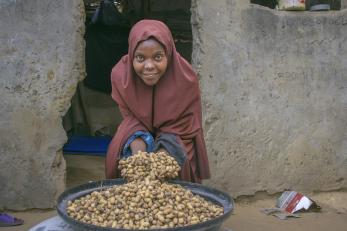
Life is often described as a series of ups and downs. However, Yabudu Alhaji Musa seems to have experienced more downs in her life. Yabudu hails from Gambaru, a town in the Ngala Local Government Area of Borno State, known for its farming activities. She grew up in a family of farmers who always had enough to eat and even shared their farmlands with their relatives.
However, things started to go wrong for Yabudu and her community when insurgents started attacking Gambaru, causing Yabudu's family to flee their home. They left everything behind, including their shoes, to escape the violence. The family has lived in an internally displaced persons (IDP) settlement in Jere for the last seven years. They have been relying on the goodwill of others and humanitarian aid to survive in a state of insecurity.
To make matters worse, in 2023, Jere experienced one of its shortest rainy seasons, which lasted only three months. There were concerns that the region would face a severe food crisis as it was still recovering from the devastating Boko Haram insurgency. On top of that, inflation was on the rise, and the devaluation of the naira made the situation even worse. This meant that the most vulnerable, including internally displaced persons, would suffer the most from the impending hunger.
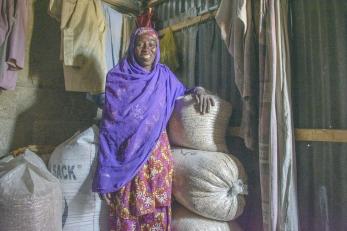
With Mercy Corps implementing the USAID-funded Transitioning Households to Recovery from Vulnerability (THRIVE) program in selected wards of Jere, a silver lining rose in the seemingly dark clouds. Families were supported with Noiler chickens and inputs for backyard gardening by the THRIVE program. During the rainy season, other program participants received arable seeds and farm implements to help them with their agricultural activities. This initiative has had a significant impact on the lives of participants.
Yabudu was among those who received seeds and farm implements. Now in her fifties, the farming spirits of Gambari still drive Yabudu, who immediately went on to plant the arable crop intervention she received and had a rich harvest.
“I had to borrow farmland to plant my seeds,” Yabudu narrated, a testament to her entrepreneurial and never-say-never attitude. She harvested three bags of millet, three and a half bags of beans, and one bag of groundnut. “I don’t intend to sell any of my farm produce,” she added. “I will keep some seeds to farm next year while we survive on the rest. The low rainfall experienced hurt the harvest,” she concluded.
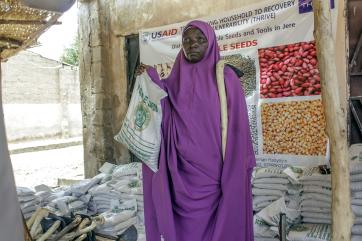
When Hauwa S. Bukar's family got enrolled in this intervention, they hoped it would help them thrive. However, it turned out to be a matter of life or death for her sister. “My sister required surgery, and I sold some of the produce to pay for it,” she explained. Hauwa’s bumper harvest of 14 bags of groundnuts, three bags of millet, and a half bag of sesame seeds was able to support her sister’s surgery with plenty left for the family of nine to feed on.
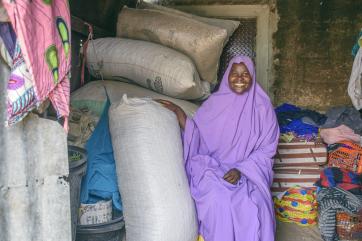
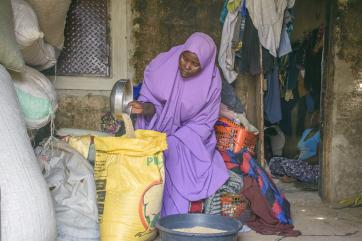
For Zara Bukar, another participant in the THRIVE program, receiving ten bags of beans, two bags of sorghum, two bags of groundnuts, and one bag of sesame seeds on the program was an opportunity for her to repay a 100,000 NGN loan and pay for the naming ceremony of her son.
“After selling some of the produce to meet immediate needs, I still have enough food to feed my family, plant our farmlands next year, and still sell some for cash,” Zara, the 27-year-old mother of six exclaimed.
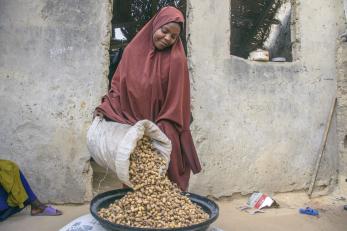
In regions such as Borno, providing humanitarian assistance is a challenging task due to the increasing needs and limited financial resources. To address this issue, THRIVE, a sustainable development program, is shifting its focus from short-term food aid to long-term solutions that promote self-sufficiency.
In Borno, the violent insurgency has devastated agriculture, leading to the collapse of traditional seed systems. Additionally, farmers have consumed their seed stocks during prolonged periods of hunger, and insecurity has restricted access to farmlands. As a result, the production of key crops like cowpeas, maize, groundnut, rice, millet, and sorghum has declined by over 75% before and during the conflict.
Despite these challenges, the THRIVE program has been able to support its participants with seeds and farm implements to grow and harvest crops during the rainy season. In its first year of implementation, the program supported 187 participants, and it plans to expand its intervention to 313 participants in the second year.
About THRIVE
Transitioning Households to Recovery from Vulnerability (THRIVE) is a 2-year program funded by USAID to provide context-specific humanitarian assistance with the goal of initiating early recovery in Jere Local Government Area, Borno State.
THRIVE works in four wards: Mairi, Mashamari, Dusuman, and Maimusari in Jere Local Government Area (LGA), Borno State, to deliver a multi-sectoral, integrated, and coordinated response, informed by participants, that leverages experience and best practices to address the multi-faceted needs and 3/10 aspirations of vulnerable people. Its area-based approach advances participants from lifesaving assistance to life-building support.
THRIVE is implemented as a consortium by the Catholic Relief Services (CRS), Mercy Corps, Women in the New Nigeria (WINN), Salient Humanitarian Organization (SHO), and Justice Development Peace Committee (JDPC).